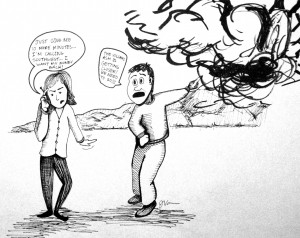Environmental angle is always present
Last week’s volcanic eruption in Iceland has brought a large part of the world to a standstill, instigating a storm of disgruntled travelers, accusations against E.U. leaders and millions of dollars in lost revenue for airlines. With eight days of closed airspace and over 95,000 canceled flights as of Tuesday, there is good reason for the airline industry and its consumers to be worried and frustrated.
The media seems to imply that the most pressing issue is figuring out how to get European travelers to their destinations. And though that is a legitimate concern, there is a significant issue being neglected here.
All this ruckus about air travel has distracted the public to the environmental impact of the eruption. What are the consequences of the eruption on our health, our climate and our planet’s well-being? There is, strangely, a lack of coverage on the environmental and health impacts of the Eyjafjallajokull volcano, during Earth Week no less.
Perhaps it’s because this was a somewhat minor eruption that hasn’t caught the concern of many volcanologists, who believe that the long-term effects are largely negligible. But looking at the stunning photographs of the seven mile-high ash plume and the dark, heavy clouds looming across Iceland, it would be hard to disregard the eruption as an occurrence with no serious consequences.
The ash contains flakes of molten rock with sharp edges that, when inhaled, are harmful and difficult to remove. And if Eyjafjallajokull were to intensify, it could trigger the adjacent Katla volcano, whose eruption could be infinitely more devastating and detrimental to the nearby population.
According to Information is Beautiful, a creative infography blog, the European aviation industry emits more than 344,000 tons of carbon dioxide a day, while the volcano has emitted over 150,000 tons per day. Thus, on the bright side, canceling 60 percent of flights this week has saved our skies over 206,000 tons of carbon dioxide.
But from what last week’s eruption has proven, even a minor, distant eruption can disrupt the entire global economy.
This year marks the 40th anniversary of Earth Week and USC’s second annual celebration. Despite the high hopes of organizers, this year’s festivities have been much less prominent than they had originally hoped; it’s a marginal event that only catches the attention of a minority of students.
In a way, this lackluster response on campus is reflective of the apathetic attitude toward the Icelandic volcanic eruption. All our attention is being focused on the distresses of travelers because of the sense of urgency to get them home. But just because there is not a similar sense of urgency to discuss how bad the eruption really was for our environment doesn’t mean it’s not equally, if not more, important than the travelers’ well-being.
According to The New York Times, organizations around the world are finding that on this 40th anniversary of Earth Week, they have had to succumb to eco-consumerism, turning to retail in order to successfully execute their Earth Day programs. Some believe eco-consumerism detracts from the original purpose of the awareness day, while others snatch the opportunity to make profits.
Robert Stone, an independent documentary filmmaker who created a film about the history of the American environmental movement, offered an interesting perspective: “Every Earth Day is a reflection of where we are as a culture. If it has become commoditized, about green consumerism instead of systemic change, then it is a reflection of our society.”
Likewise, if, after a natural disaster strikes, all we care about is whether people get to board planes again, that is a reflection of our society and the largely neglectful attitude we hold toward our environment.
Is it right to discount the importance of the environment in situations such as this?
We should be sure to consider the environmental consequences in all situations.
Nadine Tan is a sophomore majoring in business administration. Her column “World Rapport” ran Fridays.

